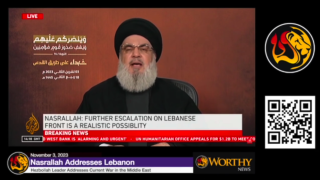
By Stefan J. Bos, Chief International Correspondent Worthy News
BEIRUT/JERUSALEM (Worthy News) – Israel’s military has confirmed Saturday that it killed Hezbollah leader Hassan Nasrallah and “most” senior leaders of the Iran-backed Islamic group.
“Most of the senior leaders of Hezbollah have been eliminated,” military spokesman Lieutenant Colonel Nadav Shoshani told reporters.
The Israeli military confirmed Worthy News reports late Friday that Nasrallah was hit in a “targeted strike” on Hezbollah’s central headquarters in Dahiyeh, Beirut.
The military said he was killed alongside other senior members of Hezbollah – including Ali Karaki, the commander of Hezbollah’s southern front.
Lebanon-based Hezbollah had no immediate comment. However, its silence suggested disarray within Hezbollah, which has been designated as an “Islamic terrorist organization” by Israel and most of its allies.
Hezbollah has struck Israel with a barrage of rockets and drones, forcing tens of thousands of people to leave parts of northern Israel.
COMMUNICATION DEVICES
The Israeli air strike meant that Hezbollah fighters woke up Saturday without a clear chain of command.
Adding to their problems was that earlier this month, their communication devices, including pagers and then walkie-talkies, exploded in what was believed to be an Israeli operation.
Lebanese officials claimed that at least 32 people, including two children, were killed and thousands more injured, many seriously, in those two attacks without specifying how many combatants were among the victims.
Israel says it regrets any causalities among innocent residents but blames Hezbollah and its ally Hamas for using civilians as human shields.
Despite suffering massive setbacks, Israel was expecting counterattacks Saturday, saying it was on “high alert” and prepared for a wider escalation.
Early Saturday, the Israeli military said it carried out several strikes in southern Beirut and eastern Lebanon’s Bekaa Valley.
MORE STRIKES
On Saturday, Hezbollah reportedly launched dozens of projectiles across northern and central Israel and the Israel-controlled West Bank, also known by its Biblical name Judaea and Samaria.
Amid the ongoing fighting, Israel said it was activating three battalions of reserve soldiers after sending two brigades to northern Israel earlier in the week to train for a possible ground invasion.
The Jewish nation has, in recent days, shifted the focus of its operation from Gaza to Lebanon, where authorities claim heavy Israeli bombing has killed more than 700 people and displaced about 118,000 people.
It was unclear how many Hezbollah fighters were among the hundreds killed, but Israel’s military says it has eliminated many Hezbollah and Hamas fighters.
The clashes have escalated since October 7 when Hezbollah ally Hamas attacked Israel, killing some 1,200 people and abducting about 251 people in what Israel described as the “worst atrocities against Jews since the Holocaust,” also known as the Shoah.
Both groups are supported by Iran, prompting Israel’s Prime Minister Benjamin Netanyahu to warn Tehran that “there is no place in Iran that Israel can’t reach.”
Copyright 1999-2026 Worthy News. This article was originally published on Worthy News and was reproduced with permission.
Latest News from Worthy News
The U.S. State Department on Friday authorized the departure of non-emergency government personnel and their family members from Israel, citing escalating “safety risks” amid intensifying regional tensions.
Polish officials say they have uncovered Hamas-style underground tunnels along the Belarus border that were allegedly used to funnel migrants into the European Union as part of what they describe as a Russian-backed campaign to destabilize the West.
The Israeli Air Force carried out a series of airstrikes Thursday in Lebanon’s Beqaa Valley, targeting eight military compounds belonging to Hezbollah’s elite Radwan Force, according to the Israel Defense Forces.
Congressional Democrats are moving to force votes in the House and Senate to block President Donald Trump from launching military action against Iran without prior congressional approval.
The third round of nuclear negotiations between the United States and Iran ended Thursday amid sharply conflicting assessments, as diplomatic maneuvering unfolded alongside one of the largest U.S. military buildups in the Middle East in years.
The FBI obtained phone records belonging to its current director, Kash Patel, during the Biden administration while he was still a private citizen, according to multiple reports confirmed Wednesday.
A Spanish-language evangelical congregation in Houston, Texas, home to one of America’s largest Hispanic communities, is mourning its founding pastor after he was accidentally shot and killed during a reported burglary attempt.







